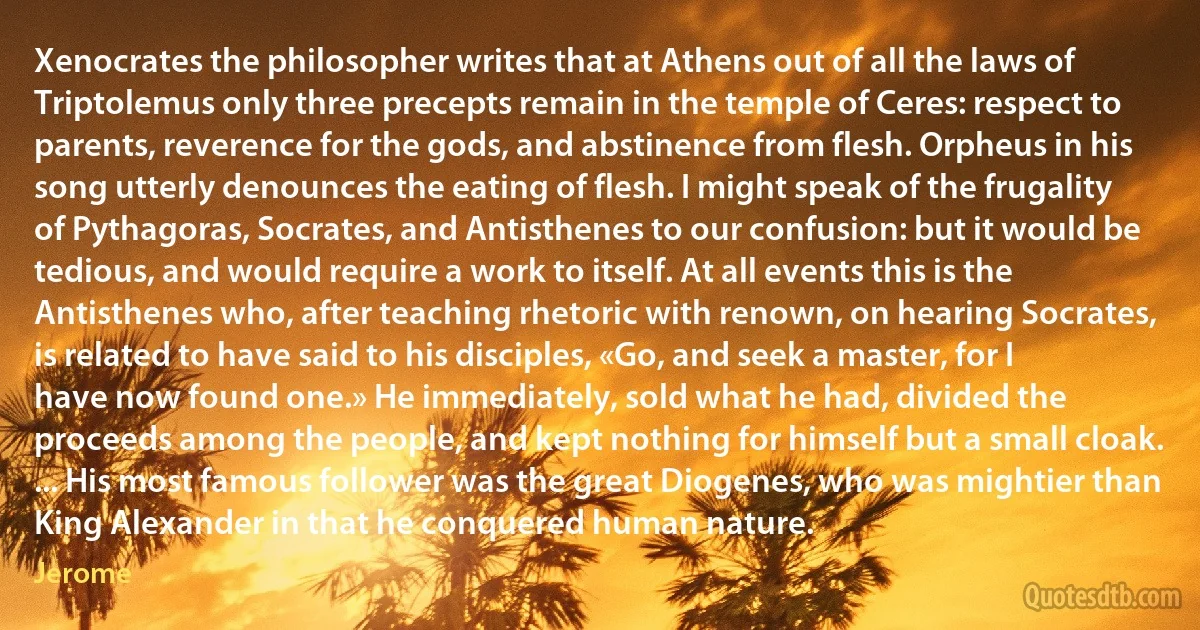
Xenocrates the philosopher writes that at Athens out of all the laws of Triptolemus only three precepts remain in the temple of Ceres: respect to parents, reverence for the gods, and abstinence from flesh. Orpheus in his song utterly denounces the eating of flesh. I might speak of the frugality of Pythagoras, Socrates, and Antisthenes to our confusion: but it would be tedious, and would require a work to itself. At all events this is the Antisthenes who, after teaching rhetoric with renown, on hearing Socrates, is related to have said to his disciples, «Go, and seek a master, for I have now found one.» He immediately, sold what he had, divided the proceeds among the people, and kept nothing for himself but a small cloak. ... His most famous follower was the great Diogenes, who was mightier than King Alexander in that he conquered human nature.
JeromeRelated topics
cloak diogenes eating found flesh great hearing human king master might mighty nature nothing now orpheus people remain respect rhetoric say seek sold small song speak teaching three work laws gods pythagoras socratesRelated quotes
And then I awoke and yet continued to dream... painting constantly appeared to me as the one and only possible achievement. I thought of my grand old friend Henri Rousseau [French Primitive painter, died in 1910] that Homer in the porter's lodge whose prehistoric dreams have sometimes brought me near the gods. I saluted him in my dream. Near him I saw William Blake, noble emanation of English genius...'Have confidence in your objects,' he said, 'do not let yourself be intimidated by the horror of the world. Everything is ordered and correct and must fulfill its destiny in order to attain perfection. Seek this path'... I awoke and found myself in Holland in the midst of boundless world turmoil. But my belief in the final release and absolution of all things, whether they please or torment, was newly strengthened. Peacefully I laid my head among the pillows... to sleep, and dream, again.

Max Beckmann
...yet we are told that this great nation, with such a record of splendid achievements in the past and in the present, is unfit to make its own laws, is unfit to control its own finance, and that it is to be placed as if it were a nation of children or lunatics, under the tutelage and guardianship of some other body-and what body? Who are the guardians of this mighty people? Who are they? With all respect, I shall have to make exceptions; but I am speaking of them as a whole. ... They are men who have neither the training, the qualifications, nor the experience which would fit them for such a gigantic task. They are men whose sole qualification-speaking in the main, and for the majority of them-they are simply men whose sole qualification is that they are the first born of persons who had just as little qualification as themselves.

David Lloyd George
I exhibited three paintings at the Salon d'Automne exhibition [Paris], which is the most interesting exhibition I have seen until now. Much more interesting than the Secession [in München]. My paintings [two words cancelled] were noticed and praised by the art critics. I think I will be very famous here in a few years time. Reading my name in the newspapers and seeing people notice my paintings and write about them has given me new and strange joy. – Paris is a beautiful city. Why do you remain in the monotony of Munich's heavy atmosphere? Here one can find everything one desires. Everything is refined and has spirit and everyday one learns something new.. The French are more intelligent than I thought. They laugh a lot, but they understand better than the Germans what is refined, strange and outside the ordinary.

Giorgio de Chirico
And now when the retorts and beakers with their several necks and tubes and the appurtenances thereof were set in order, and the unhallowed processes of fixation, conjunction, deflagration, putrefaction, and rubefication were nearing maturity, and the baleful star Antares standing by the astrolabe within a little of the meridian signified the instant approach of midnight, the King described on the floor with his conjuring rod three pentacles inclosed within a seven-pointed star, with the signs of Cancer and of Scorpio joined by certain runes. And in the midst of the star he limned the image of a green crab eating of the sun. And turning to the seventy-third page of his great black grammarie the King recited in a mighty voice words of hidden meaning, calling on the name that it is a sin to utter.

Eric Rücker Eddison
I shall never cease from the practice and teaching of philosophy, exhorting anyone whom I meet after my manner, and convincing him, saying: O my friend, why do you who are a citizen of the great and mighty and wise city of Athens, care so much about laying up the greatest amount of money and honor and reputation, and so little about wisdom and truth and the greatest improvement of the soul, which you never regard or heed at all? Are you not ashamed of this? And if the person with whom I am arguing says: Yes, but I do care: I do not depart or let him go at once; I interrogate and examine and cross-examine him, and if I think that he has no virtue, but only says that he has, I reproach him with overvaluing the greater, and undervaluing the less. ...For this is the command of God, as I would have you know...

Socrates
